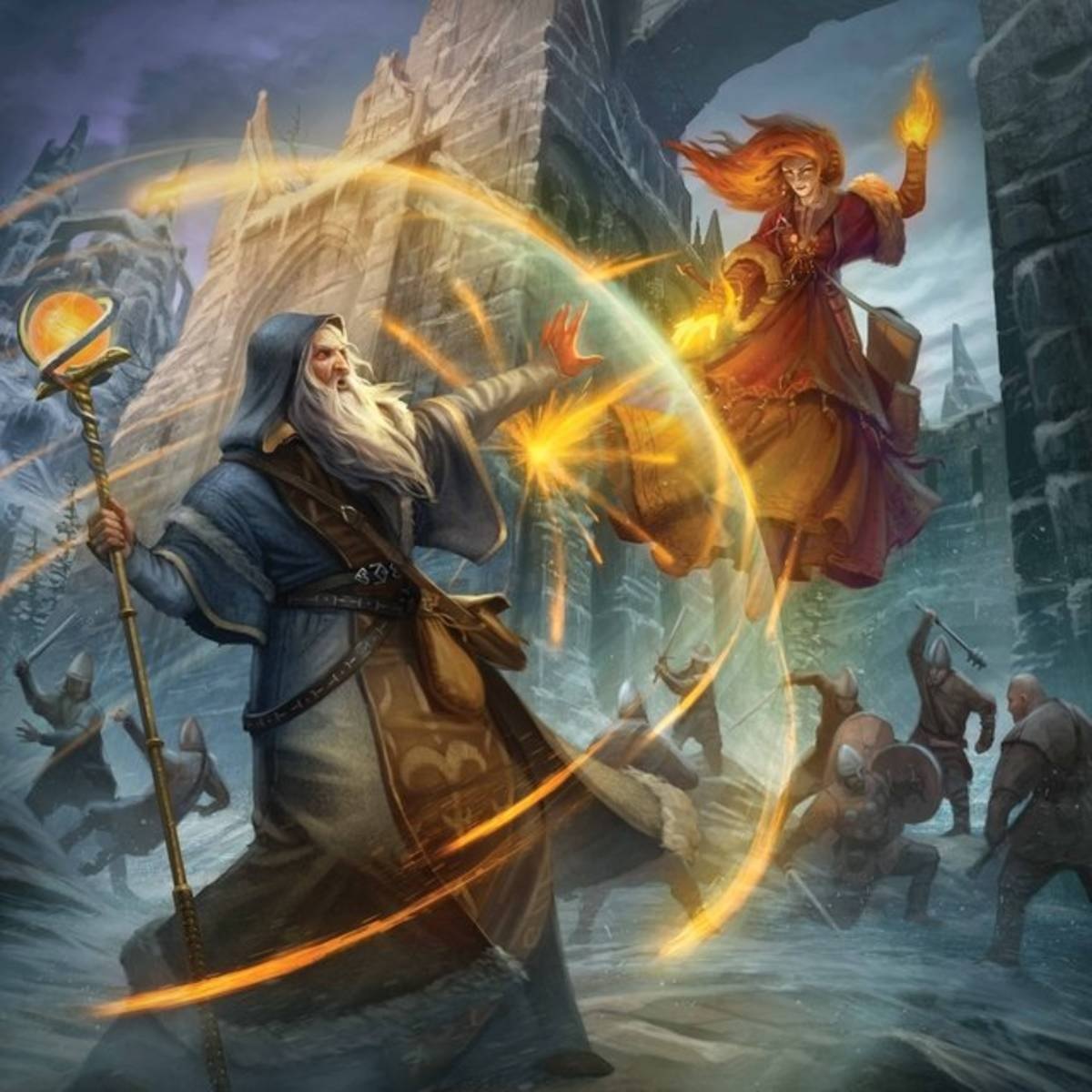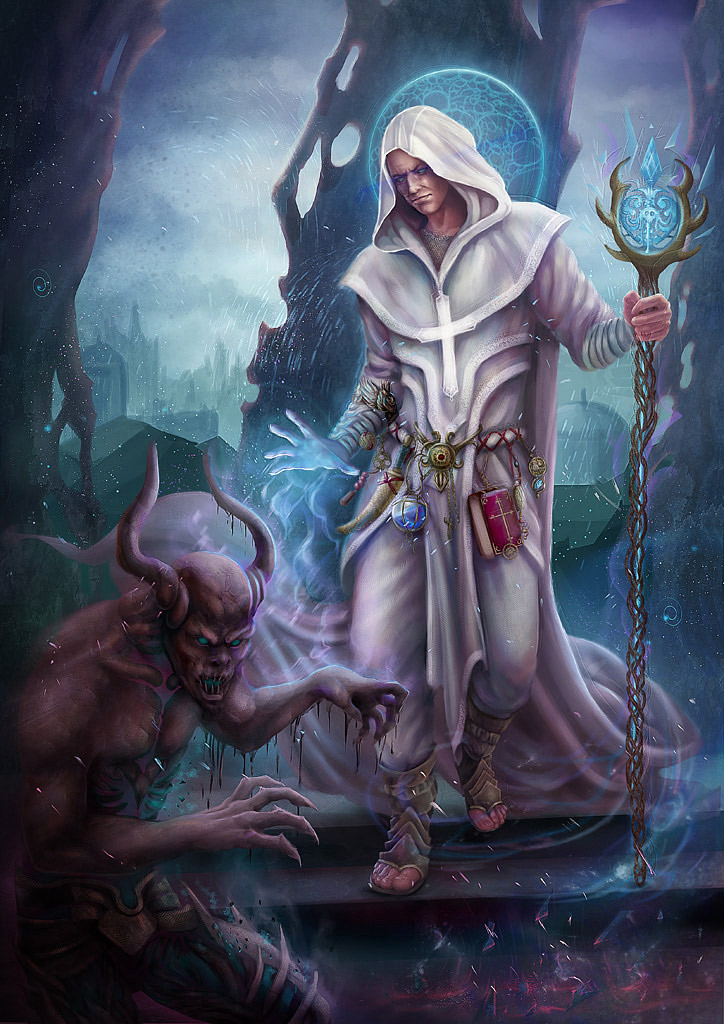Spellcasting
Spellcasting, also "casting" an incantation, describes the weaving of a spell as a means of controlling unnatural power towards a given effect. The acquisition, casting and discharging of a spell is a complex formula that certain classes are able to manage — though often generally spoken of as “magic,” there are in fact five forms of spellcasting: bardic, clerical, druidical, illusionary and magical, as cast by bards, clerics, druids, illusionists and mages. These are commonly referred to by the general terms "spellcasters" or simply, "casters."
Contents
Acquisition of Spells
Spells are acquired through characters gaining levels and choosing spells from a list that can be found by following the links of the spell-using classes above. Different spellcasters receive different numbers of spells as they advance in level. Clerics and druids gain bonus spells through wisdom. Mages have many choices but these choices are limited by the mage’s intelligence. Illusionists and mages both gain cantrips as well as spells. Some spellcasters have considerably more power than others and the amount of experience needed to go up a level often reflects this. A spell may not be duplicated (i.e., the caster cannot cast the same spell more than once per day).
On a daily basis, casters must reacquire spells they have used, a process often described as "forgetting" and "relearning" spells. Sometimes the latter is called memorising a spell. The specifics for "memorise" should be taken figuratively.
Memorising Spells
When a caster is organising a spell in their mind, the process resembles assembling a complex thought-puzzle, with various mental pieces fitted together in a manner incomprehensible to those without spellcasting ability. This intricate mental manipulation is the art spellcasters spend years mastering before achieving 1st level in their class. Each form of magic employs a distinct method of puzzle-making, so that a cleric cannot cast magical spells, possessing no more understanding of their workings than a fighter would. The process of assembling this mental puzzle requires time and must be undertaken only after the caster is fully rested.
Once the spell is mentally in place, it will remain until it is either intentionally dismantled or the caster falls asleep. The caster knows the precise order of phrases and thoughts required to dismantle the spell's mental structure, allowing the spell to be cast and subsequently "forgotten" in their mind. To reconstruct the spell, the caster must first have a night of rest (minimum six hours) to regain the clarity and focus necessary to reassemble the intricate mental puzzle.
The time required to reform a spell in the caster’s mind — or to "learn" or "memorise" it (the terms are interchangeable) — is 15 minutes per spell level. For example, a third-level spell would require 45 minutes to learn. Cantrips, being considered half-spells, each take 7½ minutes to learn. The learning process demands uninterrupted concentration; if the caster is interrupted, they must start over, as any previous effort will be lost.
Spell Forms
Bards weave spells through performance or contemplation, channelling their magic by engaging deeply with their chosen art form. Unlike other spellcasters who rely purely on mental discipline, bards use physical and creative expression to shape the intricate mental structures required for their magic. This may involve singing, dancing, juggling, sculpting, writing poetic lines or even crafting intricate objects. Each act of creation becomes a method for piecing together the mental puzzle of a spell, embedding its structure into their consciousness through rhythm, movement or creative flow.
- The specific process varies depending on the bard's focus. A bard might use an instrument, such as a lute or flute, to play a melody that aligns with the spell’s emotional or magical resonance. Alternatively, they might incorporate the fluidity of dance to trace the spell’s form in the air or create vivid imagery through poetic verse to summon the spell's power. For some, their own body acts as the medium, with gestures or rhythmic movements bringing the magic into focus. Bards that develop multiple art forms may play with casting their magic through the use of each of these; for example, a poet who learns to play an instrument as at least an amateur, may thereafter cast a spell through poetry or through music.
Clerics pray fervently to gods or demi-gods for the necessary time period, while feeling the passion of these superior powers filling their minds and hearts. In effect, it is as though the cleric were a bottle being filled; once the spell is in place, the cleric mentally places a stopper over the top of the bottle and the spell’s power remains held within the cleric, until the metaphorical stopper is removed.
Any number of gods in a cleric’s pantheon may be called upon for specific spells; generally which god provides which spell is not pre-determined, but the character can be given this information if it is requested. A monotheistic character may still pray to more than one source. A Christian may pray to God, Jesus, Mother Mary or any number of Saints. A Moslem may pray to Allah or call upon the spirit of Mohammed. Most religions are flexible in this manner. Naturally it is presumed that the cleric should seek to serve these deities and maintain their favour, since the cleric’s spell use depends upon it.
Druids seek to commune with the natural world on a deeper level than the five senses will reveal. In a way that’s difficult to explain, the druid becomes supernaturally aware of the movement of energy, living things, water and earth all around ~ even the heat and magma far beneath the world’s crust. This tremendous power is “tapped,” or gathered by the druid as the complicated form of the spell is constructed in the druid’s mind. These natural, elemental or even “astral” forces are always present, and therefore remain always available to the druid when forming spells for use.
Illusionists & Mages, who possess spells of greater power, rely upon spellbooks to store the complexity of their magic. To learn their spells, they must study the pages of these books. Illusionists and mages depend greatly upon the maintenance and care of these books; losing a spellbook is a very unfortunate affair.
Casting
Once a spell is acquired and learned, to unleash the spell it must first be cast. Casting is a time-sensitive process that must be done with great concentration and without interruption. If a spell’s casting is interrupted, and the caster’s attention is broken, even if for an instant, the effort to learn the spell is lost and the spell cannot be discharged. “Breaking” a spell while it is being cast can require as little effort as thumping a caster hard on the shoulder, giving them a push or shouting very loudly in their ear (though the last may allow an ability check for the caster’s primary attribute). Needless to say, damage from combat or some other source, an earthquake, a rush of water or heavy rain, a gust of wind or similar circumstance will also break a spell as it is being cast.
As such, spellcasters are very careful only to cast spells when they are fairly sure they will not be interrupted while doing so. This is made more difficult in that all spells have distinctly obvious verbal and somatic components. These cannot simply be performed subtly ~ they must be performed resolutely and at the appropriate volume, which means that any witnessing intelligent creature will know perfectly well that the spellcaster is “weaving” a spell (another way to describe casting). This will probably mean that an enemy will forego attacking a mere fighter a few feet away, preferring to hurl a dagger at the spellcaster to break the spell before it is ready.
Because of the nature of casting, the caster cannot dodge such an attack. In fact, the caster must be minimally conscious about what is going on all around, as the spell is everything. Therefore, if an attack is made against the caster, the caster’s dexterity is not applied to the caster’s armour class.
Take note that an ally who enters or passes through the combat hex containing a spellcaster must make an intelligence check to avoid disrupting the caster and ruining the spell. A +4 modifier is granted to this check.
1st and 2nd level spells usually require a full round to cast. As spells increase in power, they take more rounds to cast. Some spells, specifically not designed for the battlefield, may take hours to cast. Most cantrips take only a few action points in order to cast.
While casting, spellcasters are allowed to move no more than 1 combat hex per round, provided the ground is distinctly flat and free of obstacles. A caster would be presumed to trip over roots if attempting to move while weaving a spell amidst trees. Likewise, a caster could not move through water, or spy around a corner before walking into full view. A caster cannot perform any action with their hands, or use their voice to speak, as these are taken up with the process of casting the spell.
With cantrips, the time of both casting and discharging is included in the casting time, describe on each cantrip.
Holding Spells
On the threshold between casting a spell and discharging it, the caster may “hold” the spell for the right moment. While the spell is held, the caster continues to be vulnerable in the same manner as during the process of casting. However, with certain spells, the exact moment of discharge can be very important.
The concentration required, however, does have a time limit. The caster is able to hold the spell comfortably for as many rounds as they have points of constitution. For each round thereafter that the caster attempts to hold the spell, a constitution check must be made. If this check fails, exhaustion overtakes the caster and the spell is ruined.
Cantrips cannot be held in the manner of spells.
Discharging
Causing a spell to manifest itself in actuality is called “discharging,” or releasing the spell from within the spellcaster. Once discharged, the effects of a spell are real and cannot be taken back.
The act of discharge requires 1 action point. A new spell or cantrip cannot be cast in the same round that a spell or a cantrip is discharged. This also means that two cantrips cannot be cast/discharged in the same round.
Additional Notes
Spells do not require material components.
Gaining a new spell upon reaching a new level presupposes that the character has already given that spell a great deal of thought. They have memories of teachers explaining things to them about magic that have not yet taken root in the spellcaster’s mind. However, at the moment of reaching a level, the caster is assumed to have obtained an epiphany. At last, they understand the words of their teachers and comprehend how the spell is ordered in the mind, or otherwise obtained. This empowers the caster to expand their spells.
See Player Characters

